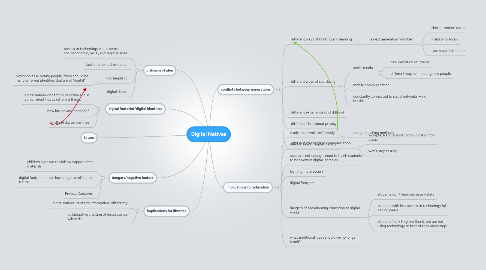Digital Natives
by Jessica Ewing


1. implications for libraries
1.1. digital natives "relate to information" differently
1.2. collaborative creation of resources i.e. wikipedia
2. criticism of idea
2.1. access to technology varies across socioeconomic, racial, and regional lines
2.2. lack of empirical evidence
2.3. too simplistic
2.3.1. pigeonholes all young people, there should be many different identities that are all "digital"
2.4. digital divide
3. dangers/negative factors
3.1. children exposed to violent/inappropriate materials
3.2. digital footprint -- can have negative effect on future
3.3. Privacy Concerns
4. future
5. digital footprint/digital identities
5.1. digital natives don't think of online and in person identities as different things
5.2. how has privacy changed?
5.3. multiple digital identites
6. conflicts between generations
6.1. different ways of thinking and learning
6.1.1. is next generation "dumber"
6.1.1.1. short attention spans
6.1.1.2. inability to focus
6.1.1.3. too much distraction
6.2. different ways of socializing
6.2.1. social media
6.2.1.1. new definition of "friend"
6.2.1.2. different ways of meeting new people
6.2.2. mobile communication
6.2.3. constantly connected to social networks -- no breaks
6.3. different experience of childhood
6.4. different ideas about privacy
6.5. different standards in communication
6.5.1. workplace and school communication too casual
6.5.2. won't stop texting
7. implications for education
7.1. study, read, write differently
7.1.1. change teaching methods
7.2. need to teach "digital literacy"
7.3. access is not enough: need to teach students to be fluent in digital literacies
7.4. learning more social?
7.5. digital footprint
7.6. dangers of not adapting education to digital world
7.6.1. students don't learn necessary skills
7.6.2. students with less access to technology fall behind peers
7.6.3. students think they are fluent, but are not using technology to best of their advantage
